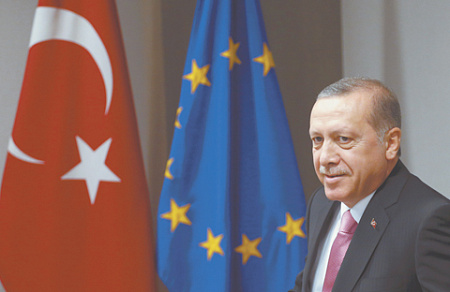
In a surprising political pivot, Turkish President Recep Tayyip Erdoğan has reignited the long-dormant topic of his country’s accession to the European Union, a goal he had previously dismissed as unfeasible. This sudden renewal of EU ambitions comes against a backdrop of intensifying pressure on Turkey’s political opposition and widespread speculation about the leader’s plans to secure another term in office, suggesting a calculated effort to win over pro-European voters who have traditionally opposed him.
Calling Turkey the EU’s “last chance,” Erdoğan declared his nation is “ready for full membership,” urging Europe to shed “outdated, obsessive political barriers.” However, the timing of his statement has raised eyebrows. It was made while returning from a visit to the self-proclaimed Turkish Republic of Northern Cyprus, a territory recognized only by Ankara. During the visit, Erdoğan reiterated his call for a two-state solution on the island, a position flatly rejected by the Republic of Cyprus—an EU member with the power to veto any of Turkey’s accession talks.
The move is widely interpreted in the context of Turkey’s domestic politics. For years, particularly since a failed coup attempt in 2016, Turkey has been drifting away from the democratic standards required for EU membership. After 22 years in power, Erdoğan’s government has been accused of systematically dismantling checks and balances. Key opposition figures, including Istanbul’s popular mayor Ekrem İmamoğlu, have been jailed, and the main opposition Republican People’s Party (CHP) faces the threat of being outlawed, actions that starkly contradict European values.
Political analysts suggest the EU rhetoric is a key component of a larger electoral strategy. Turkey’s next presidential election is scheduled for 2028, and under the constitution, Erdoğan cannot run for a third consecutive term. However, a legal loophole would permit him to stand for office if early elections are called. To succeed, he would need to broaden his appeal to the secular, pro-Western electorate in major cities like Istanbul and Ankara, a demographic that has historically been a stronghold for the CHP. By raising the prospect of EU membership, Erdoğan may be attempting to capture these voters, especially if their primary political party is weakened or removed from the race.
Turkey’s bid to join the European bloc has been a long and frustrating saga. Officially named a candidate in 1999, Ankara has watched numerous other countries, including Cyprus, join the Union while its own application stalled indefinitely. This has led to widespread disillusionment among Turks, a sentiment Erdoğan himself has previously channeled by stating that Turkey should forge its own path. His new-found enthusiasm for Europe thus marks a significant departure from his own recent nationalist rhetoric.
While some European politicians cite a fundamental incompatibility as the reason for the deadlock, many Turks believe their country’s stalled integration is a direct result of their own government’s increasingly authoritarian policies. Erdoğan’s surprising pivot appears to be a strategic gamble to re-engage this segment of the electorate, leveraging a powerful foreign policy symbol to address domestic political challenges and consolidate his grip on power for the years to come.
